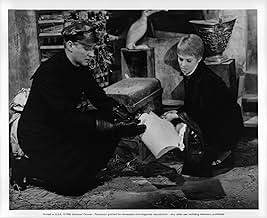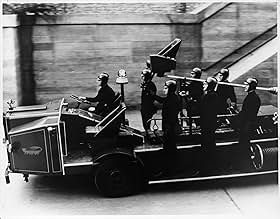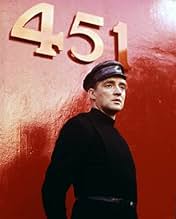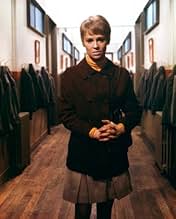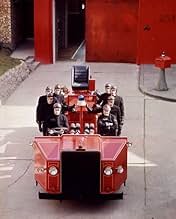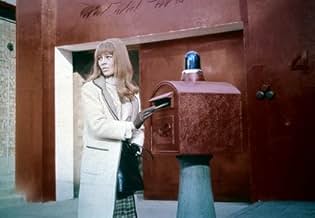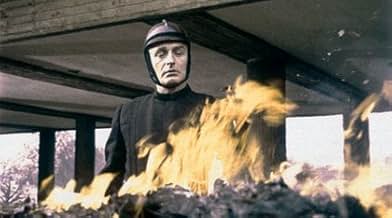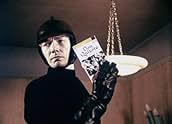AVALIAÇÃO DA IMDb
7,2/10
47 mil
SUA AVALIAÇÃO
Em um futuro opressivo, um bombeiro cujo dever é destruir todos os livros começa a questionar a tarefa que lhe foi confiada.Em um futuro opressivo, um bombeiro cujo dever é destruir todos os livros começa a questionar a tarefa que lhe foi confiada.Em um futuro opressivo, um bombeiro cujo dever é destruir todos os livros começa a questionar a tarefa que lhe foi confiada.
- Direção
- Roteiristas
- Artistas
- Indicado para 1 prêmio BAFTA
- 1 vitória e 4 indicações no total
Gillian Aldam
- Judoka Woman
- (não creditado)
Michael Balfour
- Book Person: Machiavelli's 'The Prince'
- (não creditado)
Alfie Bass
- Book Person: 'The Prince'
- (não creditado)
Yvonne Blake
- Book Person: 'The Jewish Question'
- (não creditado)
Arthur Cox
- Male Nurse
- (não creditado)
Frank Cox
- Book Person: 'Prejudice'
- (não creditado)
Fred Cox
- Book Person: 'Pride'
- (não creditado)
Noel Davis
- Cousin Midge - TV Personality
- (não creditado)
Judith Drinan
- Book Person - Plato's 'Republic'
- (não creditado)
Kevin Eldon
- Robert - First Schoolboy
- (não creditado)
Avaliações em destaque
As an avid reader and lifelong book lover, there's no way this movie couldn't affect me personally! A world without books??? NEVER!!! Whether paper, online or audio, they'd better be here to stay!!!!
The movie gets off to a good start, by showing the firemen off to what at first you may think is to fight a fire, when actually they're going to start one, by searching for and burning books! In this society, they're banned (why make people think and learn, when the soulless robots on what passes for TV can do your thinking for you and teach you enough to live in their one-dimensional society?)
The number 451 pops up all over: at the fire station, at the address of the fireman-turned-rebel, Montag (Oskar Werner), and of course, it's the temperature that paper from those outlawed books will burn! You see conflagration after conflagration of precious volumes and titles set to flame, all for your own good, of course!
Oskar does a good job as a dedicated servant of this braindead society, who comes to realize how wrong it is, and starts fighting back, even if it means committing an unforgivable crime.
Julie Christie also does good in a dual role; as Montag's wife, Linda, who listens more to the "family" on the TV screen than to her husband, and as Clarisse, a nonconformist schoolteacher that Montag gets to know while commuting to and from work. Through her, he learns there's more to life than he's been living, and much of that can be learned through those volumes he keeps destroying. When Clarisse asks if he ever read any of those confiscated books, he soon finds himself looking through a volume of "David Copperfield", and nothing's the same after that.
It's worth noting how something as simple as a hairstyle can enhance characterization. As Linda, Julie's hair is long and stylish (as are her clothes) and she gives a fashion model appearance. Her character, however, is vapid and bland. Aside from her addiction to TV and pills, she seems soulless and unfeeling. Even her seduction of Montag (not long after getting her stomach pumped) comes across as mechanical, without any real desire. She can't even remember when they first met, which gives you an idea of her true feelings for her husband!
As the short haired, plainly dressed Clarisse, Julie really becomes a whole other person, one who thinks for herself, feels strongly, and cries when a little boy at the school from where she's been fired (Mark Lester, two years before "Oliver") runs away from her. Unlike all the other modern, fireproof structures, she lives in an older building, that may be flammable but has a lot of character.
What stands out most is the solution a group of nonconformists found to the problem of destroyed books, a way to ensure they live on!! It gives what could have been a dismal film an upbeat ending.
Well worth watching!
The movie gets off to a good start, by showing the firemen off to what at first you may think is to fight a fire, when actually they're going to start one, by searching for and burning books! In this society, they're banned (why make people think and learn, when the soulless robots on what passes for TV can do your thinking for you and teach you enough to live in their one-dimensional society?)
The number 451 pops up all over: at the fire station, at the address of the fireman-turned-rebel, Montag (Oskar Werner), and of course, it's the temperature that paper from those outlawed books will burn! You see conflagration after conflagration of precious volumes and titles set to flame, all for your own good, of course!
Oskar does a good job as a dedicated servant of this braindead society, who comes to realize how wrong it is, and starts fighting back, even if it means committing an unforgivable crime.
Julie Christie also does good in a dual role; as Montag's wife, Linda, who listens more to the "family" on the TV screen than to her husband, and as Clarisse, a nonconformist schoolteacher that Montag gets to know while commuting to and from work. Through her, he learns there's more to life than he's been living, and much of that can be learned through those volumes he keeps destroying. When Clarisse asks if he ever read any of those confiscated books, he soon finds himself looking through a volume of "David Copperfield", and nothing's the same after that.
It's worth noting how something as simple as a hairstyle can enhance characterization. As Linda, Julie's hair is long and stylish (as are her clothes) and she gives a fashion model appearance. Her character, however, is vapid and bland. Aside from her addiction to TV and pills, she seems soulless and unfeeling. Even her seduction of Montag (not long after getting her stomach pumped) comes across as mechanical, without any real desire. She can't even remember when they first met, which gives you an idea of her true feelings for her husband!
As the short haired, plainly dressed Clarisse, Julie really becomes a whole other person, one who thinks for herself, feels strongly, and cries when a little boy at the school from where she's been fired (Mark Lester, two years before "Oliver") runs away from her. Unlike all the other modern, fireproof structures, she lives in an older building, that may be flammable but has a lot of character.
What stands out most is the solution a group of nonconformists found to the problem of destroyed books, a way to ensure they live on!! It gives what could have been a dismal film an upbeat ending.
Well worth watching!
Ray Bradbury's disturbing vision of a possible future comes vividly alive in this film adaption of Fahrenheit 451. Reading for pleasure is now banned although I imagine you must have a certain degree of literacy to read food can labels and directions to operate all kinds of machinery. But read for enjoyment or for education about the world beyond the small space of earth you frequent, that's a big no-no in this future America.
Oskar Werner stars in Fahrenheit 451, he plays a fireman who have a different function in this society. Buildings and such are now fireproof so fireman have become the enforcers of the ban against books. They seek and burn books in whatever quantities they find. A good job in a police state, but not a good one if you have an inquiring mind such as Werner has.
Julie Christie plays two roles, Werner's pleasure driven wife and a schoolteacher whose unorthodox for that society's teaching methods have brought her under scrutiny. She does a good job in both characterizations.
Bradbury's themes are grounded in reality. Looking at American history it was a crime in many slave holding states to educate a slave. Let them be happy in their ignorance and they might not get ideas about a better life and won't rebel.
But this is a society that's beyond that kind of formal slavery so the answer is the old Roman one of bread&circuses. The circus in this case is television which has evolved into an interactive medium. The vast wasteland that Newton Minow characterized television as back in the day has gone beyond anything Minow was having visions about. Entertainment has really dumbed down and the circuses aren't too far from what used to entertain the Romans.
In the supporting cast you will remember Cyril Cusack as the fire brigade captain who functions as the spokesman for this new world and Bee Duffring as the book lady who martyrs herself for knowledge in an unforgettable scene.
The ending is not Bradbury's, but one written by director Francois Truffaut. It is very much however in the spirit of the novel and a tribute to mankind's unquenchable thirst for knowledge. Don't miss Fahrenheit 451 when broadcast.
Oskar Werner stars in Fahrenheit 451, he plays a fireman who have a different function in this society. Buildings and such are now fireproof so fireman have become the enforcers of the ban against books. They seek and burn books in whatever quantities they find. A good job in a police state, but not a good one if you have an inquiring mind such as Werner has.
Julie Christie plays two roles, Werner's pleasure driven wife and a schoolteacher whose unorthodox for that society's teaching methods have brought her under scrutiny. She does a good job in both characterizations.
Bradbury's themes are grounded in reality. Looking at American history it was a crime in many slave holding states to educate a slave. Let them be happy in their ignorance and they might not get ideas about a better life and won't rebel.
But this is a society that's beyond that kind of formal slavery so the answer is the old Roman one of bread&circuses. The circus in this case is television which has evolved into an interactive medium. The vast wasteland that Newton Minow characterized television as back in the day has gone beyond anything Minow was having visions about. Entertainment has really dumbed down and the circuses aren't too far from what used to entertain the Romans.
In the supporting cast you will remember Cyril Cusack as the fire brigade captain who functions as the spokesman for this new world and Bee Duffring as the book lady who martyrs herself for knowledge in an unforgettable scene.
The ending is not Bradbury's, but one written by director Francois Truffaut. It is very much however in the spirit of the novel and a tribute to mankind's unquenchable thirst for knowledge. Don't miss Fahrenheit 451 when broadcast.
Go figure that I had the privilege of seeing "Fahrenheit 451," for free, on a big screen a few years back (an independent Illinois art house had gotten hold of what was allegedly one of the last surviving prints), and at the time hadn't the foggiest concept of how PRIVILEGED an event it was. Sitting in a theater crowded with college students on a budget with nothing better to do, I watched this diverting little retro item, appreciated its subtlety, nuance, bold visual style, and 'got' the message that if we're not careful, we'll be mindless drones having our desires dictated by The Tube (in current times, that's hardly a profound statement).
Francois Truffaut's adaptation of Ray Bradbury's novel is a bold visual feast that presents a time that might seem 'retrograde' in the eye of a modern pop-culture snob, but ultimately projects what a conceivable 'future' might look like (and not that CGI malarkey served up in "The Matrix"). Interiors of houses are awash in odd colors and give shelter to appliances that don't look dissimilar from our own; TV screens embedded in living-room walls play programs which vacuous housewives interact with sometimes. The film is so relentlessly confident in its appearance that it withstands the test of time.
Though if "Fahrenheit 451" only had its storybook style to rely on, it would fade and be filed away as a mere technical achievement. Truffaut, working from strong source material, concocts a riveting parable about ignorance and the things we, as humans, take for granted. The story follows Guy Montag, an Everyman who is employed as a fireman--a connotation which entails ransacking residences in search of books (reading and writing have been outlawed in this world) and burning them. He has a medicated-smile wife (Julie Christie), a quiet home life, and is in line for a promotion, until a neighbor (Christie again) inspires him to question his motives for working such a sordid job.
One character argues that books cause depression, making people confront unpleasant feelings. "Fahrenheit 451" sometimes runs the risk of lending truth to that statement--in some ways, it is a bleak commentary on civilization, but at the same time grounded in a benevolent humanity that offsets Orwell's brutal, pessimistic world of "1984" (though both texts and films share similar themes). This humanity is underlined in an upbeat, even comic ending (the details of which I won't divulge here).
"Fahrenheit 451" is a spellbinding work of art, in good company with other incendiary works ("A Clockwork Orange" and "Fight Club" come to mind) that have defied the constraints of time and age.
Francois Truffaut's adaptation of Ray Bradbury's novel is a bold visual feast that presents a time that might seem 'retrograde' in the eye of a modern pop-culture snob, but ultimately projects what a conceivable 'future' might look like (and not that CGI malarkey served up in "The Matrix"). Interiors of houses are awash in odd colors and give shelter to appliances that don't look dissimilar from our own; TV screens embedded in living-room walls play programs which vacuous housewives interact with sometimes. The film is so relentlessly confident in its appearance that it withstands the test of time.
Though if "Fahrenheit 451" only had its storybook style to rely on, it would fade and be filed away as a mere technical achievement. Truffaut, working from strong source material, concocts a riveting parable about ignorance and the things we, as humans, take for granted. The story follows Guy Montag, an Everyman who is employed as a fireman--a connotation which entails ransacking residences in search of books (reading and writing have been outlawed in this world) and burning them. He has a medicated-smile wife (Julie Christie), a quiet home life, and is in line for a promotion, until a neighbor (Christie again) inspires him to question his motives for working such a sordid job.
One character argues that books cause depression, making people confront unpleasant feelings. "Fahrenheit 451" sometimes runs the risk of lending truth to that statement--in some ways, it is a bleak commentary on civilization, but at the same time grounded in a benevolent humanity that offsets Orwell's brutal, pessimistic world of "1984" (though both texts and films share similar themes). This humanity is underlined in an upbeat, even comic ending (the details of which I won't divulge here).
"Fahrenheit 451" is a spellbinding work of art, in good company with other incendiary works ("A Clockwork Orange" and "Fight Club" come to mind) that have defied the constraints of time and age.
The Firemen take the knowledge, they won't permit, those with power make the rules, it's their remit, books are burned and turned to ash, as sparking kerosene arcs flash, if you're caught with contraband, they will commit. Montag works the fire, erasing texts, since meeting Clarisse he's increasingly perplexed, she's opened up a door, that's taken him to hidden floors, now he knows the flames he throws are all pretext.
It's not the greatest piece of filmmaking you've ever seen, and you can pull a wagon through some of the holes in the logic, but for its time, and as an example of how the few can control the many, it's still worth an exploration to benchmark where the world is all these years later.
It's not the greatest piece of filmmaking you've ever seen, and you can pull a wagon through some of the holes in the logic, but for its time, and as an example of how the few can control the many, it's still worth an exploration to benchmark where the world is all these years later.
Fahrenheit 451" is a strange film, hard to describe. No one could have interpreted the classic Bradbury novel in the same bizarre, fascinating manner as Francois Truffaut. It's a book, and a film, about freedom, choices, individuality, and intellectual repression in a future where books are forbidden; where Firemen are men who start fires...fires in which they burn books.
It was also the first color film directed by Truffaut. Although he by all accounts was not happy about making a color film and found it a bit unsettling, color is used to great effect here; sparingly, except for the extreme shade of red that is seen throughout.
"Fahrenheit 451" is supposed to be the temperature at which book paper catches fire, as the protagonist Guy Montag (Oskar Werner) explains in a scene at the beginning. Guy is a Fireman who seems happy enough with his life until he is approached by a young woman named Clarisse (Julie Christie) on his way home from work one day. She starts up a conversation with him, and the two become friendly. She bewilders him but challenges him to think and feel....and read. And when he arrives home we see his wife (also played by Julie Christie, with long hair), sedated and watching the wallscreen (TV of sorts)...we see what his life is really like, although he had told Clarisse he was "happy"...he is not.
As his friendship with Clarisse grows, he starts to secretly take home, hoard, and read some of the books he finds in the course of his daily work, and as he reads, he becomes obsessed with the books. They become his mistress, and are what finally make him feel affection and warmth. And when he starts to feel and care, so do we.
The two single best scenes are a passionate one involving an old woman who refuses to leave her books, her "children" as she calls them; and the wonderful ending of the film. The countless, painful closeups of books as they are being burned are beautifully done, and difficult to watch.
Truffaut was a well-known disciple of Alfred Hitchcock's films, so when Hitchcock fired his long-time music collaborator Bernard Herrmann during the filming of "Torn Curtain", Truffaut was thrilled to acquire his talents for his own film. The score for "F451" is beautiful, and the film would not be nearly as effective without it.
Writer/producer/director Frank Darabont ("The Green Mile", "The Shawshank Redemption") is working on a new film of "Fahrenheit 451" this year. He says it won't be a remake of the original film.
It was also the first color film directed by Truffaut. Although he by all accounts was not happy about making a color film and found it a bit unsettling, color is used to great effect here; sparingly, except for the extreme shade of red that is seen throughout.
"Fahrenheit 451" is supposed to be the temperature at which book paper catches fire, as the protagonist Guy Montag (Oskar Werner) explains in a scene at the beginning. Guy is a Fireman who seems happy enough with his life until he is approached by a young woman named Clarisse (Julie Christie) on his way home from work one day. She starts up a conversation with him, and the two become friendly. She bewilders him but challenges him to think and feel....and read. And when he arrives home we see his wife (also played by Julie Christie, with long hair), sedated and watching the wallscreen (TV of sorts)...we see what his life is really like, although he had told Clarisse he was "happy"...he is not.
As his friendship with Clarisse grows, he starts to secretly take home, hoard, and read some of the books he finds in the course of his daily work, and as he reads, he becomes obsessed with the books. They become his mistress, and are what finally make him feel affection and warmth. And when he starts to feel and care, so do we.
The two single best scenes are a passionate one involving an old woman who refuses to leave her books, her "children" as she calls them; and the wonderful ending of the film. The countless, painful closeups of books as they are being burned are beautifully done, and difficult to watch.
Truffaut was a well-known disciple of Alfred Hitchcock's films, so when Hitchcock fired his long-time music collaborator Bernard Herrmann during the filming of "Torn Curtain", Truffaut was thrilled to acquire his talents for his own film. The score for "F451" is beautiful, and the film would not be nearly as effective without it.
Writer/producer/director Frank Darabont ("The Green Mile", "The Shawshank Redemption") is working on a new film of "Fahrenheit 451" this year. He says it won't be a remake of the original film.
Você sabia?
- CuriosidadesThe film's credits are spoken, not read, in keeping with the film's theme of destruction of reading material.
- Erros de gravaçãoAfter Montag comes out of the first raid to burn the books, the placement of the fire protective clothing (helmet and gloves) are unnatural movements and appear to be a reverse run of film footage. This is further compounded by the fact that he walks backwards to get the flamethrower which has flame entering the nozzle instead of leaving the nozzle.
- Citações
Guy Montag: To learn how to find, one must first learn how to hide.
- Cenas durante ou pós-créditosThe beginning credits are spoken instead of written on the screen.
- Versões alternativasOriginally Noel Davis (who plays Cousin Midge) did the opening voice over. In the current version it is done by Alex Scott ("The Life of Henry Brulard" Book Person).
- ConexõesFeatured in Galeria do Terror: The Different Ones/Tell David.../Logoda's Heads (1971)
Principais escolhas
Faça login para avaliar e ver a lista de recomendações personalizadas
- How long is Fahrenheit 451?Fornecido pela Alexa
Detalhes
- Data de lançamento
- País de origem
- Centrais de atendimento oficiais
- Idiomas
- Também conhecido como
- Farenhajt 451
- Locações de filme
- Châteauneuf-sur-Loire, Loiret, França(Monorail)
- Empresas de produção
- Consulte mais créditos da empresa na IMDbPro
Bilheteria
- Orçamento
- US$ 1.500.000 (estimativa)
- Faturamento bruto nos EUA e Canadá
- US$ 509
- Fim de semana de estreia nos EUA e Canadá
- US$ 11.206
- 25 de abr. de 1999
- Faturamento bruto mundial
- US$ 581
- Tempo de duração1 hora 52 minutos
- Proporção
- 1.66 : 1
Contribua para esta página
Sugerir uma alteração ou adicionar conteúdo ausente

Principal brecha
By what name was Fahrenheit 451 (1966) officially released in India in English?
Responda

